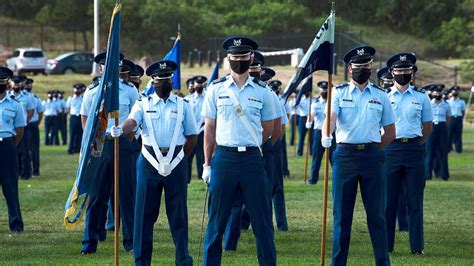
Transgender graduates of the Air Force Academy, who met all requirements for commissioning, were denied the opportunity to become officers due to a Department of Defense (DoD) policy that predates a 2021 policy change regarding transgender military service. The Air Force has stated it is working with the DoD to resolve the situation.
Several transgender Air Force Academy graduates have been denied commissions despite meeting all qualifications, prompting concerns about the implementation of inclusive military policies. These graduates, who completed their rigorous training and academic requirements, were deemed ineligible for commissioning due to a pre-existing Department of Defense (DoD) regulation, even though a 2021 policy change was intended to allow transgender individuals to serve openly. The Air Force is reportedly working to address the discrepancy with the DoD.
The situation highlights a potential disconnect between stated policy and its practical application, raising questions about the fairness and equity of opportunities for transgender service members.
According to a statement released by the Air Force, “We are aware of a Department of Defense policy that impacts a small number of our Air Force Academy graduates. The Air Force is committed to ensuring all qualified graduates receive fair consideration for commissioning. We are working with the Department of Defense to resolve this issue.”
This policy discrepancy has left these graduates in a state of uncertainty as they face an unexpected barrier to their military careers after years of dedicated service and training. The Pentagon has not yet released a detailed explanation of the situation, but sources indicate that the issue stems from specific medical regulations that have not been fully updated to align with the 2021 policy change.
The denial of commissions has drawn criticism from LGBTQ+ advocacy groups, who argue that the DoD must act swiftly to rectify the situation and ensure that transgender service members are treated fairly and equitably. These groups assert that the current situation undermines the progress made towards inclusivity in the military and sends a discouraging message to aspiring transgender officers.
Background: The 2021 Policy Change
In 2021, the Department of Defense announced significant changes to its policies regarding transgender military service. The new policy, implemented under the Biden administration, reversed a ban put in place under the Trump administration that largely prohibited transgender individuals from serving in the military.
The 2021 policy aimed to create a more inclusive environment by allowing transgender individuals to serve openly and without discrimination. Key provisions of the policy included:
-
Open Service: Transgender individuals are allowed to serve in their preferred gender.
-
Access to Medical Care: Transgender service members have access to medically necessary transition-related care.
-
Revised Medical Standards: The policy revised medical standards to ensure they are objective and based on medical necessity rather than discriminatory practices.
The policy change was hailed as a major step forward for LGBTQ+ rights and military readiness, with proponents arguing that it would allow the military to attract and retain the best talent, regardless of gender identity. However, the recent denial of commissions to Air Force Academy graduates suggests that the implementation of the policy may not be as seamless as intended.
Specific Concerns and Policy Conflicts
The primary issue appears to stem from a conflict between the overarching policy of allowing transgender individuals to serve and specific medical regulations that have not been fully updated to reflect this policy. Some medical regulations may still include provisions that could be interpreted as disqualifying transgender individuals from certain roles or commissions.
For instance, regulations related to medical readiness or deployability may not adequately account for the healthcare needs of transgender individuals or may impose requirements that are difficult for them to meet. This can result in transgender service members being deemed ineligible for certain assignments or opportunities, even if they are otherwise qualified.
Additionally, there may be inconsistencies in how different branches of the military interpret and implement the 2021 policy. This can lead to a situation where a transgender individual is eligible to serve in one branch but not another, or where they face different standards and requirements depending on their service.
Impact on Graduates and Future Recruits
The denial of commissions to these Air Force Academy graduates has significant implications for both the individuals affected and the broader military community.
For the graduates themselves, the denial represents a profound disappointment after years of hard work and dedication. These individuals have invested significant time and effort in preparing for a career in the Air Force, and they have met all the necessary qualifications for commissioning. Being denied the opportunity to serve can be emotionally and financially devastating, leaving them with limited options for their future.
More broadly, the situation sends a discouraging message to other transgender individuals who may be considering a career in the military. If qualified graduates are being denied commissions due to their gender identity, it raises questions about the military’s commitment to inclusivity and equality. This can deter talented individuals from joining the military, undermining efforts to build a diverse and representative force.
Potential Solutions and Next Steps
Addressing the current situation and ensuring that transgender service members are treated fairly and equitably will require a multi-faceted approach.
-
Policy Clarification and Updates: The DoD should conduct a comprehensive review of its medical regulations and other policies to ensure they are fully aligned with the 2021 policy change. Any conflicting or outdated provisions should be updated or eliminated to ensure consistency and clarity.
-
Training and Education: The military should provide training and education to all personnel on transgender issues and the 2021 policy. This training should aim to promote understanding and acceptance of transgender service members and to address any misconceptions or biases that may exist.
-
Individual Case Reviews: The DoD should conduct individual case reviews of all transgender service members who have been denied opportunities or faced discrimination. These reviews should be conducted by a panel of experts who are knowledgeable about transgender issues and military policy.
-
Transparency and Accountability: The DoD should be transparent about its efforts to address the current situation and should be held accountable for ensuring that transgender service members are treated fairly and equitably. This includes providing regular updates on the progress being made and addressing any concerns raised by LGBTQ+ advocacy groups and other stakeholders.
Legal and Ethical Considerations
The denial of commissions to transgender Air Force Academy graduates raises several legal and ethical considerations.
From a legal standpoint, the situation may violate the Equal Protection Clause of the Fourteenth Amendment to the United States Constitution, which prohibits discrimination based on gender. If the DoD is denying commissions to transgender individuals based on criteria that are not applied to cisgender individuals, it could be argued that they are violating the Equal Protection Clause.
From an ethical standpoint, the denial of commissions raises questions about fairness, equality, and respect for human dignity. Transgender individuals have the same right as cisgender individuals to serve their country and to pursue their chosen career path. Denying them this opportunity based on their gender identity is not only discriminatory but also undermines the values of inclusivity and diversity that the military espouses.
Responses from Advocacy Groups
Several LGBTQ+ advocacy groups have voiced their concerns over the situation. These groups emphasize that the DoD’s actions contradict its stated commitment to inclusivity and equality.
“The denial of commissions to these qualified graduates is unacceptable and undermines the progress we have made towards creating a more inclusive military,” said Sarah Kate Ellis, President and CEO of GLAAD. “The DoD must act swiftly to rectify this situation and ensure that all transgender service members are treated with the dignity and respect they deserve.”
The National Center for Transgender Equality (NCTE) has also called on the DoD to take immediate action. “This situation is a clear example of how outdated policies and discriminatory attitudes can harm transgender individuals,” said Mara Keisling, Executive Director of NCTE. “The DoD must ensure that its policies are fully aligned with its commitment to inclusivity and that transgender service members are treated fairly and equitably.”
These advocacy groups have pledged to continue working with the DoD to address the concerns raised by the denial of commissions and to ensure that transgender service members have the opportunity to serve their country without discrimination.
The Broader Context of Transgender Rights
The denial of commissions to Air Force Academy graduates occurs within the broader context of ongoing debates about transgender rights in the United States.
In recent years, there has been increasing awareness and acceptance of transgender individuals, with many states and municipalities enacting laws to protect their rights. However, there has also been a backlash against transgender rights, with some states passing laws that restrict access to gender-affirming care and that limit the participation of transgender individuals in sports.
These debates reflect fundamental disagreements about gender identity, equality, and the role of government in protecting individual rights. They also highlight the challenges of creating a society where transgender individuals are fully accepted and respected.
Looking Ahead: Ensuring Inclusivity and Equality
The situation involving the Air Force Academy graduates serves as a reminder that the fight for transgender equality is far from over. While significant progress has been made in recent years, there are still many challenges to overcome.
To ensure that transgender service members are treated fairly and equitably, the DoD must take proactive steps to address the issues raised by the denial of commissions. This includes clarifying and updating its policies, providing training and education to its personnel, conducting individual case reviews, and being transparent and accountable for its actions.
More broadly, society as a whole must continue to work towards creating a more inclusive and accepting environment for transgender individuals. This includes challenging discriminatory attitudes and beliefs, supporting policies that protect transgender rights, and celebrating the diversity and contributions of transgender people.
Only through a concerted effort can we ensure that all individuals, regardless of their gender identity, have the opportunity to live their lives with dignity, respect, and equality.
FAQ: Transgender Air Force Academy Graduates and Commissioning
1. Why were the transgender Air Force Academy graduates denied commissions?
The transgender Air Force Academy graduates were denied commissions due to a Department of Defense (DoD) policy that predates a 2021 policy change intended to allow transgender individuals to serve openly. The older policy appears to conflict with the newer, more inclusive policy, creating a barrier for these graduates despite their meeting all other qualifications. The specifics of the disqualifying regulation have not been publicly disclosed.
2. What was the 2021 policy change regarding transgender military service?
The 2021 policy change, implemented under the Biden administration, reversed a ban on transgender individuals serving in the military. It allowed transgender individuals to serve openly in their preferred gender, access medically necessary transition-related care, and revised medical standards to be objective and based on medical necessity rather than discriminatory practices.
3. What is the Air Force doing to address the situation?
The Air Force has stated that it is aware of the policy conflict and is working with the Department of Defense to resolve the issue. The Air Force is committed to ensuring that all qualified graduates receive fair consideration for commissioning.
4. What are LGBTQ+ advocacy groups saying about this situation?
LGBTQ+ advocacy groups are expressing strong concerns over the denial of commissions. They argue that the DoD must act swiftly to rectify the situation and ensure that transgender service members are treated fairly and equitably. They see the situation as undermining progress towards inclusivity and sending a discouraging message to aspiring transgender officers.
5. What are the potential legal and ethical implications of denying commissions to these graduates?
Legally, the denial of commissions may violate the Equal Protection Clause of the Fourteenth Amendment, which prohibits discrimination based on gender. Ethically, it raises questions about fairness, equality, and respect for human dignity, as transgender individuals have the same right as cisgender individuals to serve their country and pursue their chosen career path. The situation is seen as discriminatory and undermining the military’s espoused values of inclusivity and diversity.
6. What specific medical regulations are causing the conflict?
The specific medical regulations causing the conflict have not been publicly disclosed by the Department of Defense or the Air Force. However, it is believed that older regulations related to medical readiness, deployability, or transition-related care may not be fully aligned with the 2021 policy change, creating unintended barriers for transgender graduates seeking commissions.
7. How does this situation affect future transgender recruits?
This situation sends a discouraging message to other transgender individuals who may be considering a career in the military. If qualified graduates are being denied commissions due to their gender identity, it raises questions about the military’s commitment to inclusivity and equality, potentially deterring talented individuals from joining.
8. What steps can be taken to resolve this issue and prevent future occurrences?
To resolve this issue and prevent future occurrences, the DoD should conduct a comprehensive review of its medical regulations, provide training and education to all personnel on transgender issues, conduct individual case reviews of all affected service members, and be transparent and accountable for its actions. This includes clarifying and updating policies to ensure they are fully aligned with the 2021 policy change.
9. What is the long-term impact of this policy discrepancy on military readiness and inclusivity?
The long-term impact of this policy discrepancy could negatively affect military readiness and inclusivity by discouraging qualified transgender individuals from serving. It can also damage the military’s reputation as an inclusive and diverse organization, potentially hindering recruitment efforts and undermining morale among current transgender service members.
10. How are similar situations being handled in other branches of the military?
Information on how similar situations are being handled in other branches of the military is not readily available from the provided source. It is possible that different branches have different interpretations or implementations of the 2021 policy, leading to inconsistencies in how transgender service members are treated across the military. Further investigation would be needed to determine the specifics of how each branch is handling these cases.









